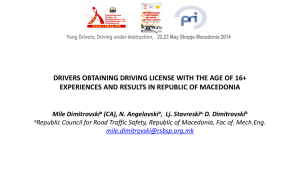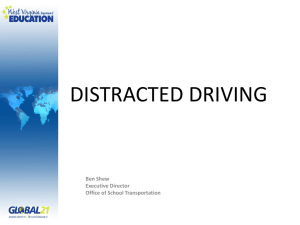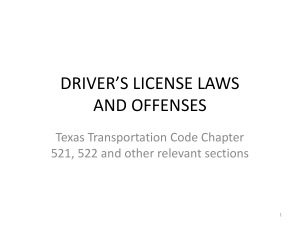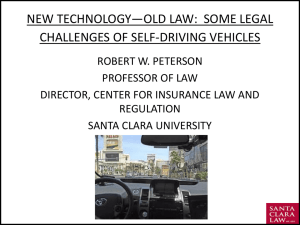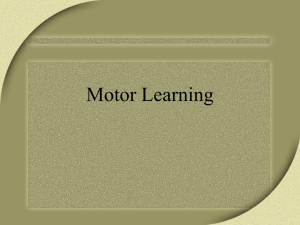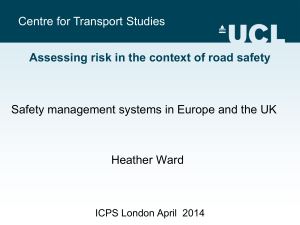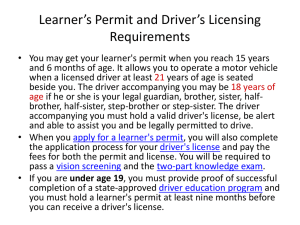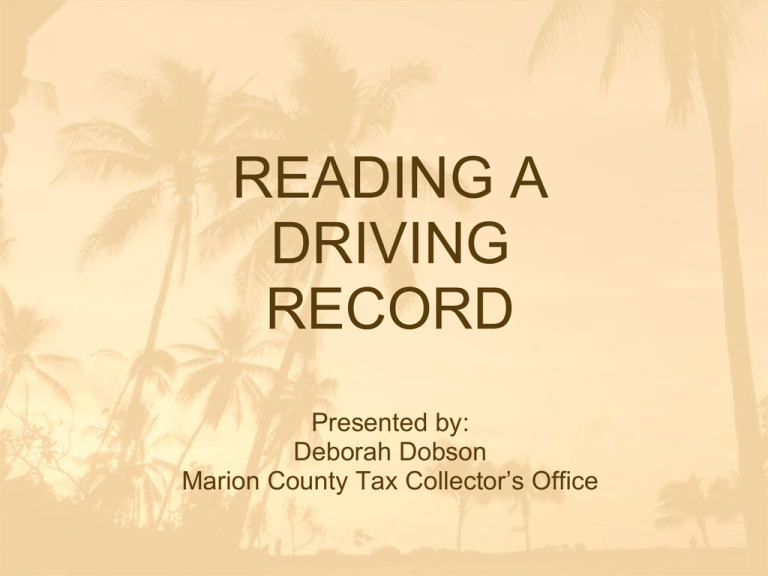
READING A
DRIVING
RECORD
Presented by:
Deborah Dobson
Marion County Tax Collector’s Office
Objectives
• Identify the different types of driving records.
• Identify the different parts of a driving record.
• Identify the order of the entries on a driving record.
• Identify violations that support sanctions using connectors.
• Identify action dates using batch numbers.
Types of Records
• 3 Year Record
– Non-Certified or Certified (not currently available in FDLIS)
– Blocked or Unblocked
• 7 year Record
– Non-Certified or Certified
– Blocked or Unblocked
• Complete Record
– Non-Certified or Certified
– Blocked or Unblocked
3 year and 7 year Driving Records
• 3 year record
- most common for insurance companies and
employment
- Uncertified only
• 3 and 7 year records do not include violations that
resulted in adjudication withheld
• 7 year records can be certified – Tax Collector raised
seal must be placed over the director’s pre-printed
signature
Complete driver record
• Contains information pertaining to a
customer’s entire driving record, excluding
any items that meet the purge criteria
• Complete records include violations resulting
in adjudication withheld
Transcript reprints must be completed the same day
High volume requests www.flhsmv.gov/ddl/abstract.html
Blocked
Unblocked
119.0712 (2) Executive branch agency-specific exemptions from inspection or
copying of public records.—
•
•
•
•
2) DEPARTMENT OF HIGHWAY SAFETY
AND MOTOR VEHICLES.—
(a)For purposes of this subsection, the term
“motor vehicle record” means any record that
pertains to a motor vehicle operator’s permit,
motor vehicle title, motor vehicle registration, or
identification card issued by the Department of
Highway Safety and Motor Vehicles.
(b)Personal information, including highly
restricted personal information as defined in 18
U.S.C. s. 2725, contained in a motor vehicle
record is confidential pursuant to the federal
Driver’s Privacy Protection Act of 1994, 18
U.S.C. ss. 2721 et seq. Such information may
be released only as authorized by that act;
however, information received pursuant to that
act may not be used for mass commercial
solicitation of clients for litigation against motor
vehicle dealers.
(c)1. Emergency contact information contained
in a motor vehicle record is confidential and
exempt from s. 119.07(1) and s. 24(a), Art. I of
the State Constitution.
•
•
2. Without the express consent of the person to
whom such emergency contact information applies,
the emergency contact information contained in a
motor vehicle record may be released only to law
enforcement agencies for purposes of contacting
those listed in the event of an emergency.
(d) The department may adopt rules to carry out the
purposes of this subsection and the federal Driver’s
Privacy Protection Act of 1994, 18 U.S.C. ss. 2721 et
seq. Rules adopted by the department may provide
for the payment of applicable fees and, prior to the
disclosure of personal information pursuant to this
subsection or the federal Driver’s Privacy Protection
Act of 1994, 18 U.S.C. ss. 2721 et seq., may require
the meeting of conditions by the requesting person
for the purposes of obtaining reasonable assurance
concerning the identity of such requesting person,
and, to the extent required, assurance that the use
will be only as authorized or that the consent of the
person who is the subject of the personal information
has been obtained. Such conditions may include, but
need not be limited to, the making and filing of a
written application in such form and containing such
information and certification requirements as the
department requires.
Driver Privacy Protection Act
(DPPA)
Under state law, motor vehicle, driver license, and vehicular
crash records are subject to public disclosure. The Driver Privacy
Protection Act, 18 United States Code, Sections 2721-2725
(DPPA) keeps your personal information private by limiting
who has access to the information. The department
automatically blocks personal information on your motor vehicle
and driver license records.
DPPA
What kind of personal information
does DPPA cover?
What does DPPA not cover?
•
• As defined in 18 United States
Code, Section 2175: personal
information protected under
DPPA does not include
"vehicular crashes, driving
violations, and driver's status."
DPPA is designed to limit public
access to your social security
number, driver license or
identification card number,
name, address, telephone
number, medical or disability
information, and emergency
contact information contained in
your motor vehicle and driver
license.
Can I request personal information on my motor vehicle and
driver license records be disclosed?
Yes, you can print Request For Disclosure of Personal Information Form
( HSMV 96104 ), write in the required information, and mail the form to the
department. This will unblock your personal information and allow anyone
requesting motor vehicle, driver license, and vehicular crash records to obtain your
personal information.
To subsequently request to re-block your personal information, you can print a
Request To Withhold Personal Information Form ( HSMV 96018) , write in the
required information, and mail the form to the department. This will again block your
personal information.
These forms are on our website at: http://www.flhsmv.gov/ddl/DPPAInfo.html
Personal Information
Basic Record Information
• Personal Information
–
–
–
–
–
Name
Address
Social Security Number
Driver License Number
Date of Birth (personal but not part of DPPA)
• Driver License/Exam & other Information
–
–
–
–
License type, issue and expiration dates
Exams passed
Driver Ed completion date
Height, Race, Sex
Entry Order of Record History Information
•
•
•
•
•
•
•
•
•
•
•
Temporary Permits
Receipt Only Transactions
Identification Card Issuances
Correspondence Entries
Driver School Completions
Crash Entries, when citation is issued
Convictions of Violations
Revocations
Disqualifications
Suspensions
Financial Responsibility Suspensions
Date of crash, offense, or effective date of sanction
Date of conviction
Reinstatement Date
County or State
City
Type of Court
Ex (County)
Type of Action
(crash, conviction, suspension, revocation, or cancellation)
Description of action
(example: conviction reason - Unlawful Speed)
Representation
C- Represented by counsel
W - Counsel waived
Citation Codes
C - indicates citation issued
Crash Codes
A - indicates Crash
Dispositions Codes
•
•
•
•
•
1 - Guilty
2 - Estreature
These deal with oos citations
3 - Forfeiture
4 - Adjudicated Delinquent
5 - Adjudication Withheld
The above disposition codes are listed under “Disp” on
public records or “DP” on department records.
What are the different types of dispositions?
•
Guilty – convicted of a ticket or having admitted guilt.
•
Estreature – when a person has posted bond to guarantee an appearance in
court, then does not appear.
•
Forfeiture – when the person who posted bond doesn’t show up for court and
forfeits the right to contest the ticket.
•
Adjudicated Delinquent – when juvenile is found to have committed an offense
that, if committed by an adult, would be a criminal offense.
•
Adjudication Withheld- Clerk of Court – when eligible person elects,
completes and provides proof of driver school completion to the court, in lieu of
conviction (points), and when person who enters a plea of nolo contendere, and
provides proof of compliance to the court, in lieu of conviction.
•
Adjudication Withheld – when the judge or traffic magistrate withholds
adjudication of guilt.
Disposition Codes
1- Guilty
5 - Adjudication Withheld
Action Codes
D - Department Action
C - Court Action
Ticket Number or
Court Docket
Citation Numbers
Pay close attention to citation numbers. They
help to link DUI administrative suspensions,
convictions and revocations. Remember one
$130 Administrative fee per event.
Citation Numbers
are the same
• Citations with a ticket number of “0000” were
transferred to the Florida record from another
state’s driving record, in accordance with the
Driver License Compact.
ON THE “DL HISTORY INQUIRY PAGE”
This indicates how many times a customer has
attended BASIC DRIVER IMPROVEMENT in a
lifetime.
Law Changed as of July 1, 2010
5 TIMES IN A LIFETIME
Issuance Batch Numbers
012804K02 - Means this duplicate was issued
on January 28, 2004 at office number K02
Reading Batch Numbers for
Driver History Entries
• Basically all batch numbers contain the same
information: The year the entry was added to the
record, the day of the year(Julian date), and the
coder ID number of who/what added the
information.
• For example: “93242126” means that the entry was
added in 1993 on the 242nd day of the year by coder
number 126.
More on Batch Numbers
• Not all batch numbers look the same, but they break
down basically the same way.
– For example: “4096LA” means the entry was
added in 1994 on the 96th day of the year by
coder LA.
– “99160B50” means the entry was added in 1999
on the 160th day of the year by office B50.
Retention period for
driver history record entries
•
Guilty Convictions
Approximately 10 years
•
Adjudication w/held COC
Indefinite
•
Adjudication w/held Judge
Indefinite
•
Suspensions & Revocations
(from reinstatement date)
7 to 11 years
•
Alcohol Related Entries
75 years
•
Serious CDL Violations
55 years
•
Cleared D6 Suspensions
(from reinstatement date)
3 years
Driving Record Errors
Citation posted incorrectly or does
not belong to the customer
• Contact the court jurisdiction where the
citation was issued for them to clarify and
send a correction
DUBAL or Refusal discrepancies
• Contact BAR
Questions?

